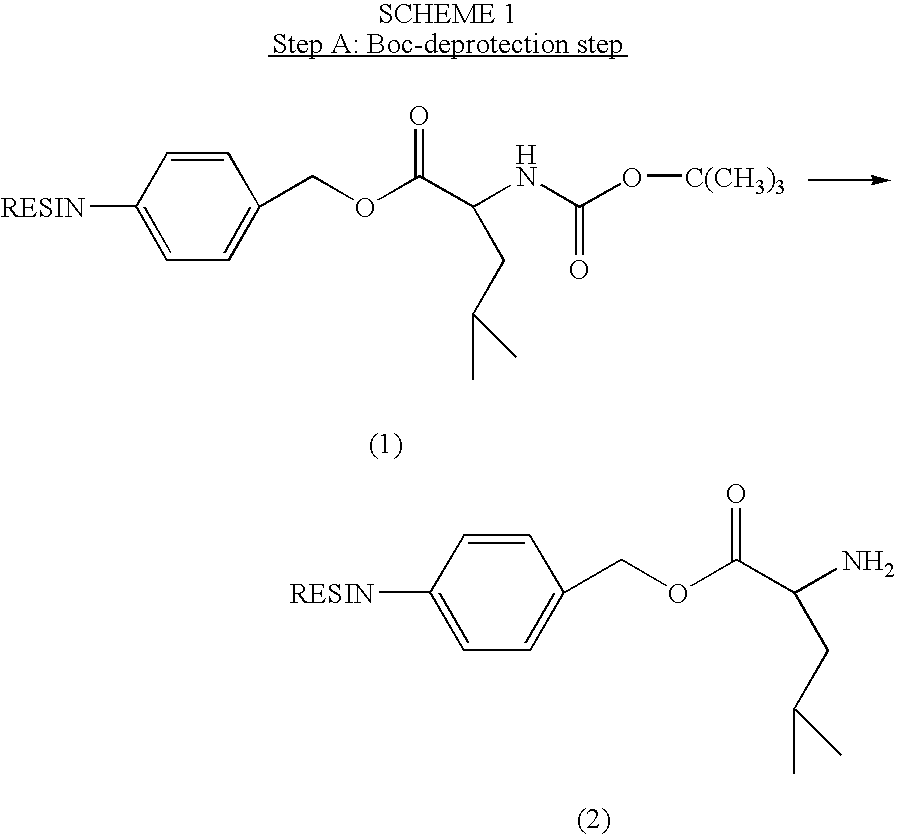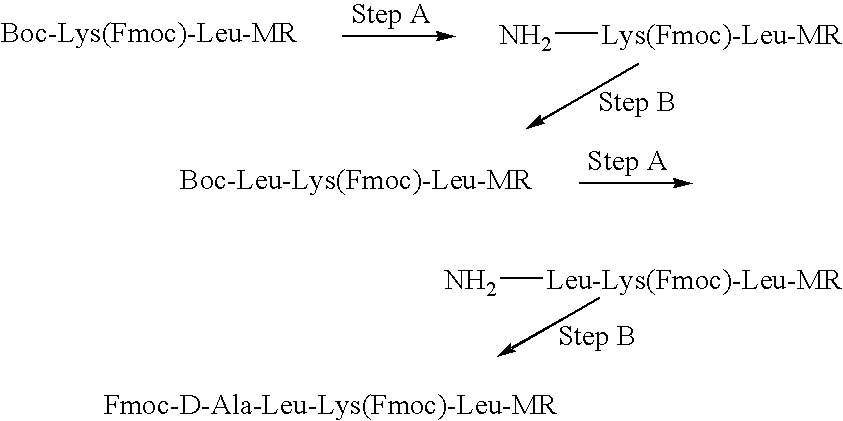Prodrugs activated by plasmin and their use in cancer chemotherapy
a technology of plasmin and prodrugs, which is applied in the direction of peptides, drug compositions, peptides, etc., can solve the problems of high toxicity limits the application of prodrugs, the toxicity of prodrugs is often acute, and the stability of prodrugs is often low in blood and serum, so as to reduce the toxicity of a therapeutic agent and reduce the toxicity of the therapeutic agent.
- Summary
- Abstract
- Description
- Claims
- Application Information
AI Technical Summary
Benefits of technology
Problems solved by technology
Method used
Image
Examples
example 1
Synthesis of DNR and DOX Prodrugs
D-Ala-Leu-Lys-Leu-DNR (Compound I, DNR; SEQ ID NO:5) and D-Ala-Leu-Lys-Leu-Leu-DNR (Compound II, DNR; SEQ ID NO:6) were synthesized by covalent coupling of the protected peptide on the anthracyclines or on their L-Leucyl derivatives.
[0250]Compound I was synthesized by linking the peptide D-Ala-Leu-Lys-Leu to DNR. The Fmoc-protected tetrapeptide Fmoc-D-Ala-Leu-Lys(Fmoc)-Leu-OH was produced by SPPS using Boc-Leu-Merrifield resin, N-α-Boc-N-ε-Fmoc-Lys-OH (“Boc-Lys(Fmoc)-OH”), N-α-Boc-Leu-OH (“Boc-Leu-OH”) and N-α-Fmoc-D-Ala-OH (“Fmoc-D-Ala-OH”), with DCC as the coupling agent (See Scheme I).
[0251]The Fmoc-protected peptide was then coupled to the amino-group of DOX or DNR or of their L-Leucyl derivative using HATU as the coupling agent and piperidine for Fmoc deprotection (See Scheme II).
[0252]Progress of the coupling and deprotection reactions was followed by TLC (CHCl3:CH3OH:H2O; 120:20:1 by volume) and HPLC (See General Methods, Section C.). The fina...
example 2
Plasmin Activity in Human Blood and Blood Stability of Compounds I, DNR and II, DNR
[0255]Determination of plasmin activity was done as described in General Methods, Section N. A solution of D-Ala-Leu-Lys-7-amido-4-methylcoumarin was mixed with human blood to the final concentration of 5 μM and incubated at 37° C. for 15 min and the supernatant taken for analysis. Blood in the control solution was replaced by water. Solutions of Compounds I, DNR and II, DNR in water (17.24 mM) were added to the freshly collected (on citrate) whole human blood from healthy donors (final concentration; 0.06 mM for Compound I, DNR; 0.18 mM for Compound II, DNR) and incubated at 37° C. The compounds were extracted and HPLC samples prepared as described in General Methods, Section I. DOX was used as the internal standard. The samples were analyzed by the HPLC method described in General Methods, Section J.
[0256]No traces of plasmin-like activity were discovered in human blood with the synthetic substrate,...
example 3
Hydrolysis of Compounds I, DNR and II, DNR by Human Plasmin
[0260]Compounds I, DNR and II, DNR (0.17 mM), as well as D-Ala-Leu-Lys-7-amido-4-methylcoumarin (0.17 mM) were incubated at 25° C. in the presence of 0.1 units of human plasmin in a 50 mM, pH 8.0 TES buffer. For Compounds I, DNR and II, DNR, HPLC samples were prepared and analyzed by HPLC (See General Methods, Section J). In case of D-Ala-Leu-Lys-7-amido-4-methylcoumarin, after 1 hour of incubation, the fluorescence of the resulting solution was determined at λexc=350 nm, λem=496 nm (See General Methods, Section N.).
[0261]Compound II, DNR (0.05 mM) was incubated at 25° C. in the presence of 0.01, 0.05 or 0.1 units of human plasmin in a 50 mM, pH 8.0 TES buffer. After 15, 45 and 60 min of incubation, triplicate aliquots were removed and the drugs and metabolites extracted prior to HPLC analysis (See General Methods, Section J.).
[0262]Compounds I, DNR and II, DNR (17.24 μM) were incubated in a medium freshly conditioned by the...
PUM
| Property | Measurement | Unit |
|---|---|---|
| Fraction | aaaaa | aaaaa |
| Time | aaaaa | aaaaa |
| Time | aaaaa | aaaaa |
Abstract
Description
Claims
Application Information
 Login to View More
Login to View More - R&D
- Intellectual Property
- Life Sciences
- Materials
- Tech Scout
- Unparalleled Data Quality
- Higher Quality Content
- 60% Fewer Hallucinations
Browse by: Latest US Patents, China's latest patents, Technical Efficacy Thesaurus, Application Domain, Technology Topic, Popular Technical Reports.
© 2025 PatSnap. All rights reserved.Legal|Privacy policy|Modern Slavery Act Transparency Statement|Sitemap|About US| Contact US: help@patsnap.com



